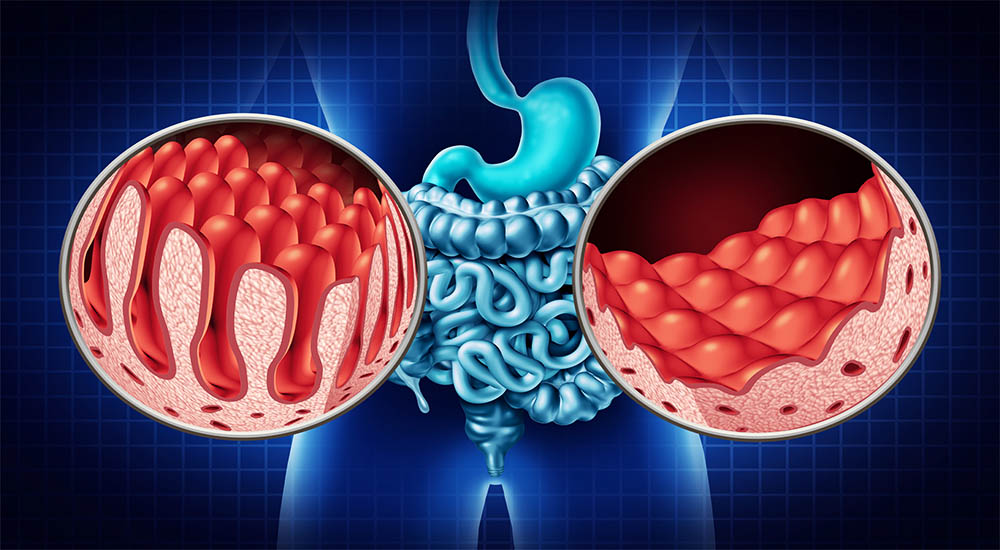Cause of Increased Incidence of Celiac Disease

 Undiagnosed Celiacs are 4x More Likely to Die
Undiagnosed Celiacs are 4x More Likely to Die
Dr. Joseph Murray, a Mayo Clinic specialist in gastroenterology, led a study that spanned 5 decades and included over 9,000 participants. It was presented in the journal Gastroenterology in July 2009. The study found that subjects who were unaware they had celiac disease were almost four times more likely than non-celiacs to have died during the 45 years of follow-up the study spanned.
Celiac Disease is More Common Now Than 50 Years Ago
Dr. Murray reports that celiac has become much more common in the last 50 years. He also remarked that undiagnosed or ‘silent’ celiac disease may have a significant impact on survival. He felt that putting together the increased prevalence with the impact on mortality made celiac a significant public health issue.
I’d like to interject at this point with a definition of silent celiac disease. It is most often used to mean that someone has positive blood test results for celiac plus some injury to the small intestine but they have no symptoms of any serious nature prompting them to see a doctor. These individuals are typically found in a random screening. It is felt that these individuals go on to acquire typical or atypical symptoms of celiac later in life.
Screening Would Save Lives & Money
I don’t think it makes a lot of sense that an individual could go on for very long with intestinal damage without developing some symptoms. It seems that these people are being screened (as perhaps we all should be) and the screening is acting as the early diagnosis that we so desperately need to prevent the later illnesses so often found secondary to celiac and gluten sensitivity. Now we just need to get to the point where we can agree that not only do we need to screen our population, but a positive test, be it a tissue transglutaminase antibody, endomysial antibody, or gliadin antibody (from blood, saliva, or perhaps stool) needs to be acted upon with a gluten-free diet immediately upon receipt of the test, whether symptoms are severe or not.
One of our biggest problems, in my opinion, is that we wait too long to diagnose gluten intolerance, including celiac and gluten sensitivity. Earlier diagnosis would prevent many diseases. Continue reading for the proof of this statement.
In the study mentioned above, the Mayo Clinic research group tested samples from blood collected between 1948 and 1954 for the tissue transglutaminase antibody (a classic blood test for celiac disease) and if positive, the endomysial antibody (also a blood test for celiac but considered less reliable at this writing) as well. They then compared these results with recent samples collected from individuals the same age as the group who donated their blood in the 1950s as well as a group currently the same age as the initial participants. Thus the ages and birth years were both matched.
Our Current Population is 4.5x More Likely to Develop Celiac Disease
The results were that young people today are 4.5 times more likely to have celiac disease than young people were in the 1950s, while those whose birth years were matched to the original participants were four times more likely to have celiac disease.
Dr. Murray stated that “celiac disease is no longer rare” and he went on to say: “Something has changed in our environment to make it much more common.” “This study suggests that we may need to consider looking for celiac disease in the general population, more like we do in testing for cholesterol or blood pressure.”
Well, all I have to say is “Hurray!”, someone who agrees with us! Here at our clinic, we test everyone for celiac and gluten sensitivity. It should absolutely be part of a regular blood test and physical exam, in my opinion.
Gluten Intolerance Masquerades as Other Diseases
Dr. Murray also stated: “Part of the problem is that celiac symptoms are variable and can be mistaken for other diseases that are more common, such as IBS. Some studies have suggested that for every person who has been diagnosed with celiac disease, there are likely 30 who have it but are not diagnosed. And given the nearly quadrupled mortality risk for the silent celiac disease, we have shown in our study, getting more patients and health professions to consider the possibility of celiac disease is important.”
Why the Increased Incidence?
I’d like to postulate a reason for this dramatic increase in prevalence. Genetics don’t change that rapidly. This is similar to the dramatic rise in autism, you just can’t blame genes for an increased incidence in such a short period of time.
If we hearken back to what Dr. Fasano said in Scientific American several months ago, I think we can get some answers. He stated that the presence of gluten in the diet, even with a genetic predisposition, isn’t enough to cause villous atrophy (intestinal damage) unless there is already some inflammation present in the intestine. It’s like a fire with no preceding spark – it doesn’t happen.
The big question is: What is the spark composed of? And, what creates the initial damage such that the immune system can now be affected by gluten? If we compare life in the 1950s to now, I think we can come up with some viable answers to these questions.
1. Our increasingly poor diet, including not only poor quality food in the form of fast food, but genetically modified food, animal products tainted with chemicals, drugs, and heavy metals, not to mention the decreased ingestion of pure, organic fruits and vegetables is very likely creating an adverse effect on the health of our intestines.
2. Perhaps as a direct result of number 1 above, we have a poor distribution of healthy probiotics in our intestines. These beautiful organisms that, chameleon-like, can change from friend to neutral to foe, depending on the milieu (environment) in which they reside, are becoming key-players on the research front for their ability to not only strengthen our immune system but the fact that they also alter the way our genes are expressed, aid in digestion, as well as synthesize vitamins.
3. There is much concern about our ever-increasing ingestion of dairy products. Research from around the world states that the vast majority of us lose our ability to digest milk products after the age of about 3 or 4 and the association between countries that consume higher quantities of dairy products and such diseases as autism, digestive complaints, allergies, heart disease, and cancer, to name a few, are mounting.
Is dairy one of the pro-inflammatory culprits that inflame the small intestine thereby setting the stage for gluten to create small intestinal damage? I can’t state the answer categorically but we do see a strong association between those who are gluten intolerant also having negative reactions to dairy products.
The take away from this paper is profound. Celiac is increasing in prevalence (4.5 times in 50 years) and undiagnosed/silent celiac puts people at risk for premature death. And the numbers in that “silent” category are likely up to 30% (or more) of our population!
What would happen if we added gluten sensitivity to this list? I presume that its incidence is increasing at a similar rate to that of celiac disease and since we don’t have a definitive test that typical gastroenterologists are familiar with, the number of undiagnosed gluten-sensitive patients is rather overwhelming in scope.
Individuals Diagnose Themselves When Their Doctors Won’t!
There is hardly a day that goes by now that I don’t hear a success story from someone around the world who, sometimes despite unbelieving medical professionals, diagnosed themselves and successfully treated their health care problems as a result of eliminating gluten from their diet.
The most recent one was from a woman whose liver was malfunctioning. All the tests normalized when she removed gluten from her diet. Her doctor was about to put her on steroids to handle the liver inflammation when, despite his advice to the contrary, she removed gluten from her diet. This is all very real and the research is only serving to corroborate that fact.
It’s upsetting that patients have to be “renegades” sometimes and be willing to change their diet against medical advice to find out that they are indeed suffering from gluten intolerance.
I’ll be happy when the day comes that universal understanding of the ill effects of gluten is common amongst the medical community. Please let me know if I can assist you in any way.
Do you need help with your health?
We have the diagnostic and testing tools, the clinical experience, and a different medical approach to discovering the root cause of why you have the symptoms that are bothering you. As long as you are ready to make some dietary and lifestyle changes, we can help you. We will "hold your hand" through the changes, step by step, to make each step an easy one. We are located in Clearwater, FL, at 1000 S Ft Harrison, at the corner of Ft. Harrison Ave. and Magnolia St. There is plenty of parking space directly accessible from Ft Harrison. If it is not convenient for you to come to Root Cause Medical Clinic, we offer telehealth/telemedicine consultations to residents of certain states. Call us for details.
Contact us for a Consultation – Call 727-335-0400

Dr. Vikki Petersen DC. CCN
Founder of Root Cause Medical Clinic
Certified Functional Medicine Practitioner
Dr Vikki Petersen is a public speaker, author of two books, several eBooks and creates cutting edge content for her YouTube community. Dr Vikki is committed to bringing Root Cause Medicine and its unique approach to restoring health naturally to the world.
Ask a Doctor
Have a health concern you'd like to speak with a doctor about? Or just want clarity on a subject? Ask Us!

 Undiagnosed Celiacs are 4x More Likely to Die
Undiagnosed Celiacs are 4x More Likely to Die
